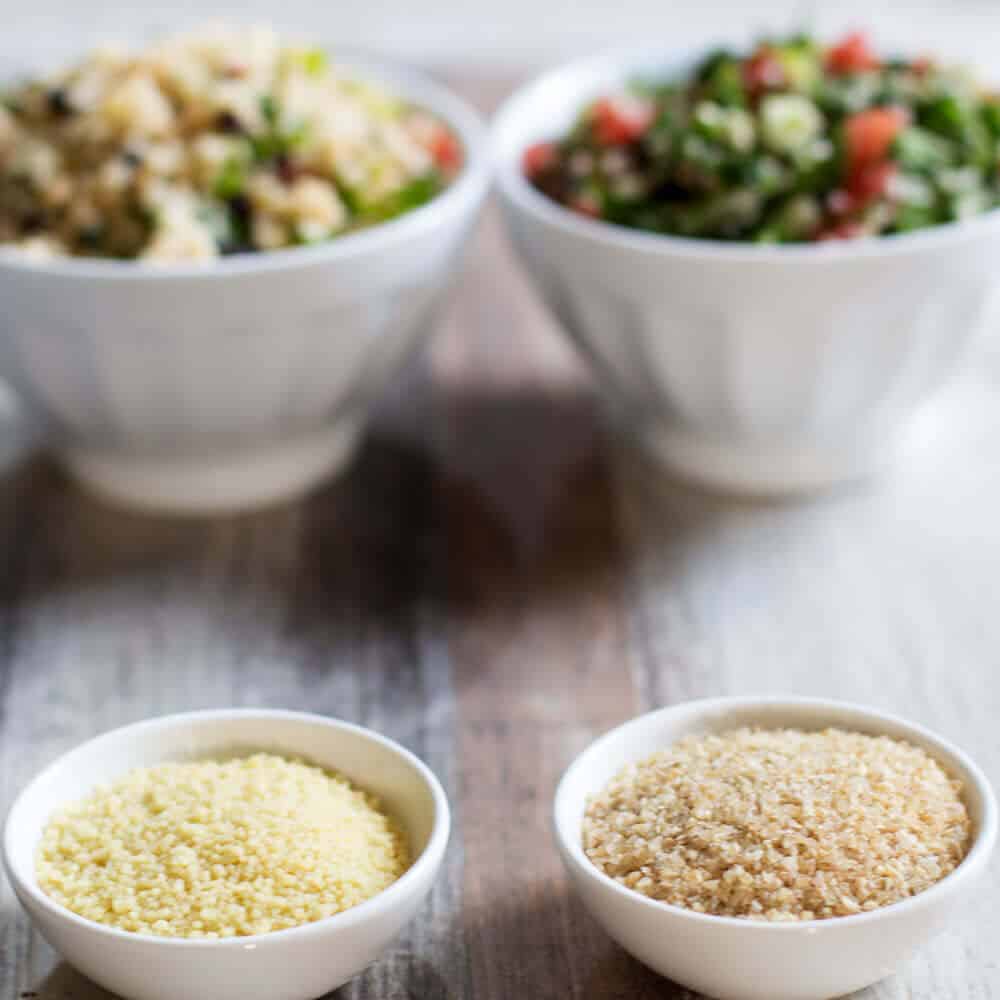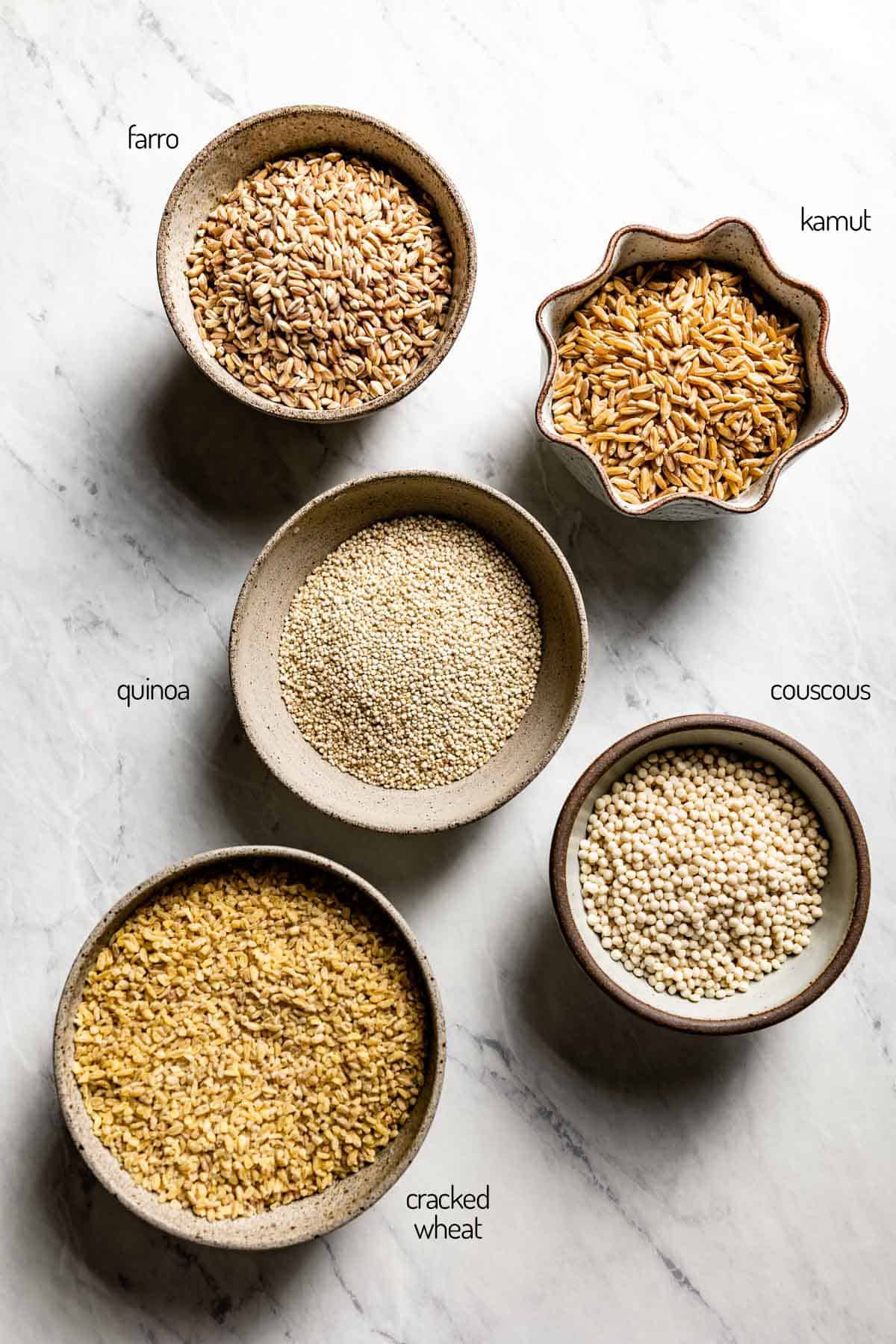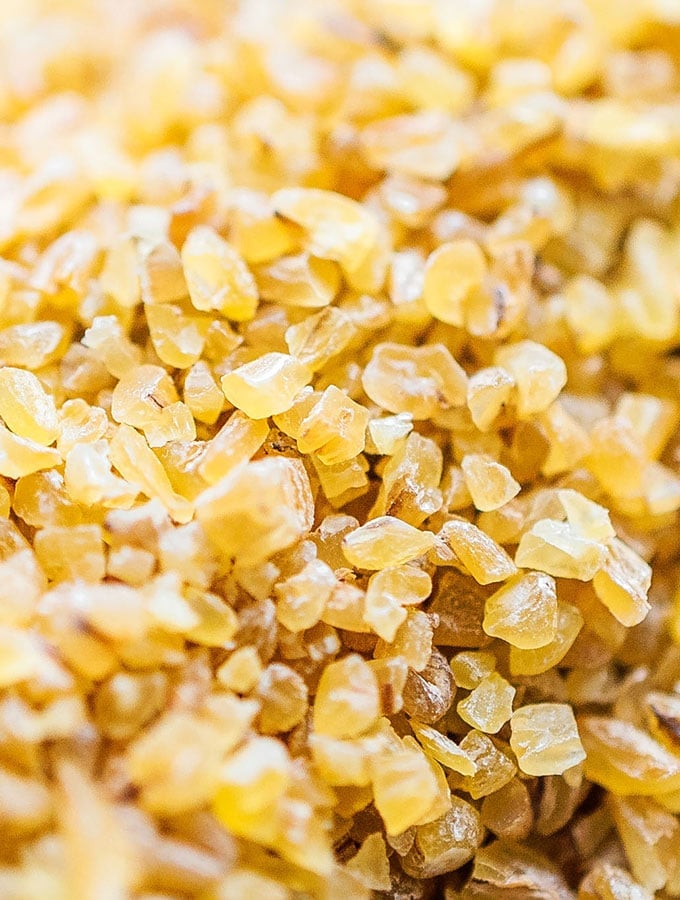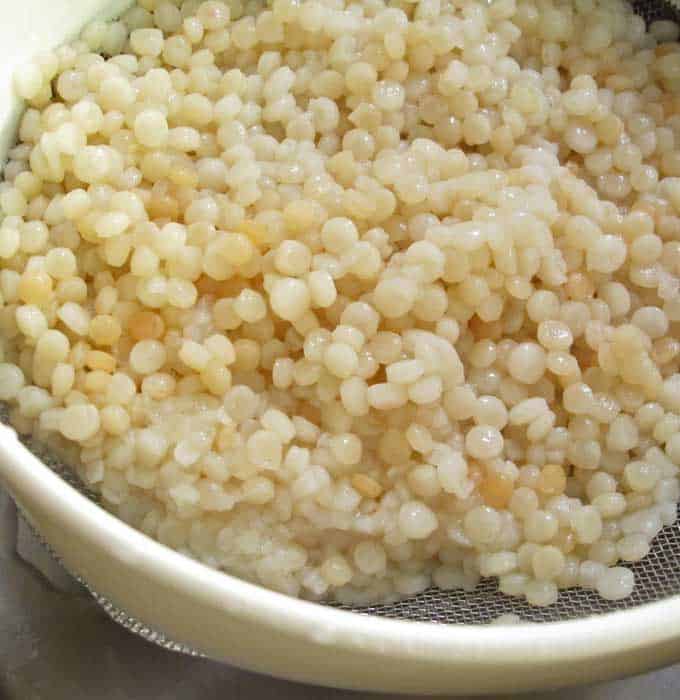Overview Of Bulgur Wheat And Couscous

Bulgur wheat and couscous are two popular grains that have been consumed for centuries. Bulgur wheat is made from the whole grain of wheat that has been partially cooked, dried, and crushed into small pieces. It is commonly used in Middle Eastern and Mediterranean cuisines. Couscous, on the other hand, is made from durum wheat semolina that is moistened and rolled into tiny granules. It is a staple in North African and Middle Eastern dishes. While both grains are nutritious and versatile, they differ in terms of texture, flavor, and cooking techniques.
1 Definition And Origins Of Bulgur Wheat And Couscous
Bulgur wheat and couscous are two distinct grains with unique characteristics and historical origins. Bulgur wheat is made from whole wheat berries that have been parboiled, dried, and cracked into smaller pieces. It originated in the Middle East and is commonly used in Mediterranean cuisine. Couscous, on the other hand, comes from North Africa, specifically Morocco. It is made from durum wheat semolina that is moistened and rolled into tiny granules. Known for its association with Moroccan cuisine, couscous has gained popularity worldwide. Both grains offer a rich history and a diverse range of culinary applications.
2 Nutritional Value And Benefits Comparison
Bulgur wheat and couscous offer distinct nutritional profiles and unique health benefits. Bulgur wheat is high in fiber, providing about 5 grams per cooked cup, while couscous only contains about 2 grams. On the other hand, couscous is lower in calories and fat compared to bulgur wheat. Both grains are rich in vitamins and minerals, including iron and B vitamins. They also provide a good source of carbohydrates, making them excellent energy sources. Incorporating these grains into your diet can contribute to overall health and well-being.
Bulgur Wheat

Bulgur wheat is a versatile whole grain that offers numerous health benefits. It is made from the whole grain of wheat that is cracked, partially boiled, dried, and then ground into smaller pieces. This process retains the grain’s high fiber content, which aids in digestion and helps regulate blood sugar levels. Bulgur wheat is also a good source of essential vitamins and minerals, such as iron and B vitamins, making it a nutritious addition to any diet. Its nutty flavor and chewy texture make it a popular ingredient in salads, pilafs, and soups.
A Detailed Analysis
When it comes to a detailed analysis of Bulgur Wheat and Couscous, it is important to understand their distinct characteristics. Bulgur Wheat, made from cracked and ground wheat grains, offers a chewy texture and a nutty flavor. It is commonly used in salads, pilafs, and soups. On the other hand, Couscous is a pasta-like grain made from semolina, which results in a light and fluffy texture. Couscous is often served as a side dish or used as a base for stews and tagines. Both grains have their own unique qualities, making them suitable for different dishes and culinary preferences.
1 Types And Forms Of Bulgur Wheat
Bulgur wheat comes in various types and forms, each offering its own distinct characteristics. Some common types include fine, medium, and coarse bulgur. Fine bulgur is the smallest and cooks quickly, making it ideal for tabbouleh salads. Medium bulgur is more commonly used in pilaf dishes, while coarse bulgur has a chewier texture and is perfect for stews and soups. Bulgur can also be found in different colors, such as white, red, or black, depending on the type of wheat used. Its versatility makes it suitable for a wide range of dishes.
2 Cooking Methods And Recipes Using Bulgur Wheat

When it comes to cooking with bulgur wheat, there are several methods to choose from. The most common method is to cook it on the stovetop, similar to how you would cook rice. Simply bring water or broth to a boil, add the bulgur wheat, and let it simmer until tender. Another method is to soak the bulgur in hot water or broth until it absorbs the liquid and becomes soft. This method is great for cold salads or as a base for grain bowls.
Here are a few delicious recipes that feature bulgur wheat:
- Tabbouleh Salad: Combine cooked bulgur wheat with chopped tomatoes, cucumbers, parsley, mint, lemon juice, olive oil, and salt. Serve chilled as a refreshing salad.
- Bulgur Pilaf: Sauté diced onions and garlic in olive oil until fragrant. Add bulgur wheat and cook for a few minutes. Then, add vegetable broth and simmer until the liquid is absorbed and the bulgur is tender. Fluff with a fork before serving.
- Bulgur-stuffed Bell Peppers: Mix cooked bulgur wheat with sautéed onions, garlic, ground beef or lentils, and your choice of spices. Stuff the mixture into bell peppers and bake until the peppers are tender and the filling is cooked through.
These cooking methods and recipes demonstrate the versatility of bulgur wheat and how it can be incorporated into a variety of dishes.
Couscous
Couscous is a small type of pasta that is made from coarsely ground wheat. It is commonly used in North African and Middle Eastern cuisine and is loved for its versatility and quick cooking time. Couscous is available in various forms, including instant or pre-steamed, which requires just a few minutes of soaking in boiling water. It has a mild and slightly nutty flavor, and its light and fluffy texture make it a popular choice for salads, stews, and side dishes. Couscous is a great option for those looking for a quick and easy grain alternative.
A Detailed Analysis
When it comes to a detailed analysis of Bulgur Wheat and Couscous, there are several factors to consider.
- Types and Forms: Bulgur Wheat comes in various forms, such as fine, medium, and coarse, offering different textures and cooking times. On the other hand, Couscous is predominantly available in instant or pre-steamed form, which requires minimal soaking.
- Cooking Methods and Culinary Uses: Bulgur Wheat can be cooked by simmering in water, broth, or milk, and it is commonly used in pilafs, salads, and stuffing. Couscous, on the other hand, is usually prepared by pouring boiling water over it, making it a quick and easy side dish or base for stews and salads.
When considering which grain to use, it is important to take into account their different textures, flavors, and cooking methods. Experimenting with both Bulgur Wheat and Couscous will allow you to discover the unique qualities of each and find the perfect fit for your culinary creations.
1 Types And Forms Of Couscous

Couscous comes primarily in two forms: regular couscous and Israeli couscous. Regular couscous is the most common and is made from semolina wheat. It has a small, granular texture and cooks quickly. Israeli couscous, also known as pearl couscous, has larger pearls and a chewier texture. It is made from durum wheat and takes slightly longer to cook. Both forms of couscous can be used in various recipes, such as salads, side dishes, and main courses. They are versatile grains that add a delightful texture to any dish.
2 Preparation Techniques And Culinary Uses Of Couscous
Couscous is incredibly versatile and can be prepared in a variety of ways. The most common method of preparation is by simply steaming or boiling it in water or broth. This allows the couscous to absorb the liquid and become fluffy and tender. Another technique is to toast the couscous in a bit of olive oil before cooking, which adds a nutty flavor.
In terms of culinary uses, couscous can be used as a base for salads, mixed with vegetables, herbs, and dressings for a refreshing side dish. It can also be used as a stuffing for vegetables or in soups. Couscous can even be sweetened and used in desserts. Its mild flavor and fluffy texture make it a great addition to a wide range of dishes.
Bulgur Wheat Vs Couscous: Texture And Flavor
When it comes to texture and flavor, Bulgur Wheat and Couscous have distinct characteristics. Bulgur offers a delightful chewiness and tenderness when cooked, making it a great choice for pilafs and grain salads. On the other hand, Couscous mesmerizes with its lightness and fluffy texture that readily absorbs flavors, perfect for pairing with stews and curries. In terms of flavor, Bulgur has a nutty and earthy taste, while Couscous has a milder, neutral flavor. Both grains add unique textures and flavors to dishes, so choosing between them depends on personal preference and the desired outcome of the dish.
1 Contrasting Textures And Flavors Of Bulgur Wheat And Couscous

Bulgur Wheat and Couscous offer distinct textures and flavors that can elevate any dish. When cooked, Bulgur Wheat has a delightful chewiness and tenderness that adds substance to meals. Its nutty and earthy flavor brings depth to dishes. On the other hand, Couscous amazes with its lightness and fluffy texture that readily absorbs flavors. It has a milder, neutral flavor, making it a versatile grain that pairs well with a variety of ingredients. Whether you prefer the chewy bite of Bulgur or the fluffy consistency of Couscous, both grains provide unique textures and flavors to enhance your culinary creations.
2 Pairing Suggestions And Serving Recommendations
Pairing suggestions for Bulgur Wheat and Couscous can enhance the flavors and create delicious meals.
For Bulgur Wheat, it pairs well with Mediterranean flavors like tomatoes, cucumbers, and feta cheese in a refreshing tabbouleh salad. It also complements hearty dishes such as stews and roasted vegetables. Additionally, Bulgur Wheat can be used as a base for veggie burgers or stuffed peppers for added texture.
When it comes to Couscous, it can be paired with various vegetables, herbs, and spices to create flavorful salads or side dishes. It is often served alongside Moroccan tagines or mixed with roasted vegetables for a satisfying meal. Couscous can also be used as a base for stuffed bell peppers or as a fluffy bed for grilled meats or stir-fried vegetables.
Both grains offer versatility and can be incorporated into a wide range of dishes, allowing you to get creative in the kitchen and explore different flavor combinations. Whether you prefer the nuttiness of Bulgur Wheat or the neutrality of Couscous, these grains can be delicious additions to your culinary repertoire.
Health Benefits And Considerations
Both Bulgur Wheat and Couscous offer health benefits, but there are some considerations to keep in mind.
Bulgur Wheat is a nutritious grain that is high in fiber, protein, and minerals such as manganese and magnesium. It is also low in fat and calories, making it a healthy choice for weight management.
Couscous, on the other hand, is lower in fiber and protein compared to Bulgur Wheat. However, it is still a good source of carbohydrates and provides some essential vitamins and minerals.
When it comes to considerations, individuals with gluten intolerance or celiac disease should opt for gluten-free alternatives to both Bulgur Wheat and Couscous.
In conclusion, both grains can be part of a healthy diet, but the choice depends on individual nutritional needs and dietary restrictions.
1 Nutritional Content And Health Benefits Of Bulgur Wheat

Bulgur Wheat is highly nutritious and offers numerous health benefits. It is rich in fiber, providing about 8 grams per cooked cup, which promotes healthy digestion and helps prevent constipation. Additionally, it is a good source of protein, with around 8 grams per cup, making it an excellent choice for vegetarians and vegans. Bulgur Wheat also contains essential minerals like manganese and magnesium, which support bone health and muscle function. Its low fat and calorie content make it a suitable option for weight management. Furthermore, the high fiber content helps regulate blood sugar levels and reduce the risk of cardiovascular diseases.
2 Nutritional Content And Health Benefits Of Couscous
Couscous is a nutritious grain that offers several health benefits. It is a good source of carbohydrates, providing energy for the body. It is also low in fat and cholesterol, making it a heart-healthy option. Couscous contains essential minerals like selenium, which acts as an antioxidant, and potassium, which helps regulate blood pressure. Additionally, it is rich in protein, promoting muscle growth and repair. Incorporating couscous into your diet can contribute to weight management and support overall well-being.
Conclusion And Which Grain To Choose
After comparing the nutritional values, cooking methods, textures, and flavors of Bulgur Wheat and Couscous, it is clear that both grains have their own unique qualities and culinary uses.
When it comes to selecting the ideal grain for your dishes, consider your personal preferences, dietary needs, and the specific recipe you are preparing.
If you prefer a nutty flavor and a chewy texture, Bulgur Wheat is a great choice. It is also higher in fiber and protein, making it a more nutritious option.
On the other hand, if you prefer a lighter and fluffier texture, Couscous is a suitable choice. It is quick to cook and versatile in absorbing flavors and seasonings.
Ultimately, the decision between Bulgur Wheat and Couscous depends on your taste preferences and the desired outcome of your dish.
1 Key Differences And Similarities Between Bulgur Wheat And Couscous

Bulgur Wheat and Couscous have both similarities and differences. The key differences lie in their composition and cooking methods. Bulgur Wheat is made from whole wheat kernels that are cracked and parboiled, resulting in a slightly chewy texture. Couscous, on the other hand, is made from semolina flour and has a lighter and fluffier texture. While Bulgur Wheat is more nutritious, being higher in fiber and protein, Couscous is quicker and easier to cook. Despite these differences, both grains are versatile and can be used in a variety of dishes.
2 Final Thoughts On Selecting The Ideal Grain For Your Dishes
When it comes to selecting the ideal grain for your dishes, it ultimately depends on your personal preferences and the specific requirements of your recipe. Bulgur Wheat offers a hearty and nutty flavor, along with its high fiber and protein content. Couscous, on the other hand, is known for its light and fluffy texture, making it a quick and convenient option. Consider the desired texture and flavor profile of your dish, as well as any nutritional considerations, to make the best choice. Whichever grain you choose, both Bulgur Wheat and Couscous are versatile ingredients that can enhance a wide range of dishes.
FAQ About Bulgur Wheat Vs Couscous: Grain Options Compared
Q: What is Bulgur Wheat?
A: Bulgur wheat is a whole wheat grain that is cracked and partially cooked. It is a nutritious option packed with fiber, protein, and essential nutrients.
Q: What is Couscous?
A: Couscous is a type of small steamed balls of crushed durum wheat semolina. It is a staple in North African cuisine and is quick to prepare.
Q: How do Bulgur Wheat and Couscous differ in terms of preparation?
A: Bulgur wheat typically requires cooking in boiling water for about 10-20 minutes, while couscous involves soaking in hot water or broth for a few minutes until it fluffs up.
Q: What are the nutritional differences between Bulgur Wheat and Couscous?
A: Bulgur wheat is higher in fiber and protein compared to couscous, making it a more filling and nutrient-dense option. Couscous, on the other hand, is lower in fiber but higher in carbohydrates.
Q: Can Bulgur Wheat and Couscous be used interchangeably in recipes?
A: While Bulgur wheat and couscous have similar textures, they do have distinct flavors and nutritional profiles. It is best to use them according to the specific recipe for the desired taste and texture.
Q: Are Bulgur Wheat and Couscous gluten-free?
A: Bulgur wheat contains gluten since it is made from wheat, while couscous is also a wheat-based product and therefore not suitable for those with gluten sensitivities or celiac disease.
Q: How do the costs of Bulgur Wheat and Couscous compare?
A: Generally, couscous tends to be more affordable and widely available compared to Bulgur wheat, which may be pricier and less commonly found in grocery stores.

Hot Pot Chinese Restaurant, located in Mechanicsville, MD 20659, is a culinary destination that offers a delightful array of Chinese cuisine. From the cozy ambiance to the delectable dishes, Hot Pot Chinese Restaurant is dedicated to providing an exceptional dining experience for all patrons. Since our establishment, Hot Pot Chinese Restaurant has been committed to serving the finest Chinese food, offering a diverse menu that caters to a wide range of tastes. Whether you’re craving traditional favorites like Kung Pao Chicken and Mongolian Beef or seeking out more adventurous options like Szechuan Spicy Hot Pot, our menu has something to satisfy every craving.